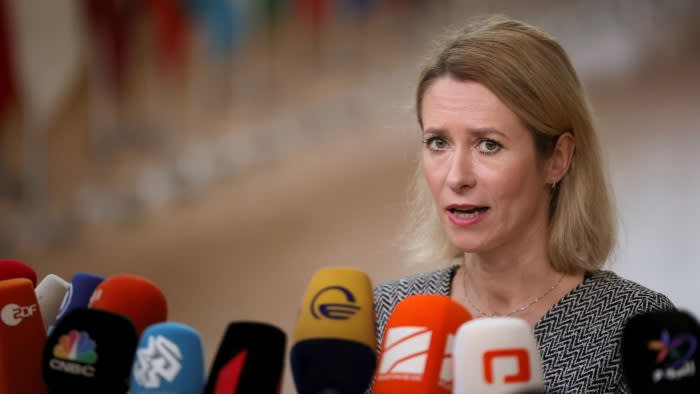Unlock the Editor’s Digest for free
Roula Khalaf, Editor of the FT, selects her favourite stories in this weekly newsletter.
EU leaders gathering in Brussels have vowed to find a way to support Ukraine after Hungary’s Viktor Orbán vetoed a €50bn lifeline for the war-torn country.
Estonia’s Prime Minister Kaja Kallas said that “Ukraine will not be left without support” and that there was a “strong will” among the other 26 EU member states to deliver the necessary aid. Belgian PM Alexander De Croo also reassured Kyiv that “we will be there to support you, we need to figure out a few details”.
In the early hours of Friday, EU leaders failed to convince the Hungarian prime minister to agree to the €50bn funding package for Ukraine, which would have come from the bloc’s common budget and be paid to Kyiv over the next four years in the form of grants and loans.
The EU’s leaders will reconvene for a summit in January for further talks in the hope that they can bring Orbán on board or force the package of support through without his backing.
The sense of urgency for the EU to find a solution is amplified by the US Congress’s repeated failure to approve a $60bn aid package proposed by the White House. On Thursday, Congress agreed to the much smaller sum of $300mn as part of a wider military spending bill as negotiations over the larger package drag on.
Irish Taoiseach Leo Varadkar said that he believed there was a “work around” that could be crafted.
“We still think it’s possible to get an agreement among the 27, we will try to get to that space in the new year,” Varadkar said. “A bit of time and space over the Christmas period may help.”
Estonia’s Kallas said that a solution among the 26, outside the EU budget, could be found but warned it would take more time.
“We are all democracies and democracies take time, but Ukraine does not have the time.”
Despite vocal opposition prior to the summit, Orbán did allow leaders to approve the start of EU accession talks with Ukraine by leaving the room during the vote. He said on Friday he did so because there were still ample opportunities to veto Kyiv’s accession process in the years to come.
“It was necessary to send this political signal to our friends in Ukraine,” Lithuanian President Gitanas Nausėda said. “Of course this is only the first page of [a] very long process.”
On the aid package, Orbán said: “They wanted to give the money of the member states, and thus also the money of the Hungarians, to Ukraine. And I said, well, this is already a specific violation of rights, let’s stop, I have to veto this.”
A decision on Wednesday from the European Commission to release €10bn to Hungary that was previously blocked on rule of law grounds failed to bring Orbán on board.
Leaders are due to discuss the situation in the Middle East and security and defence during the remainder of the summit on Friday.
Additional reporting by Marton Dunai in Budapest
